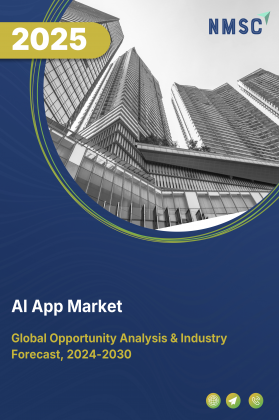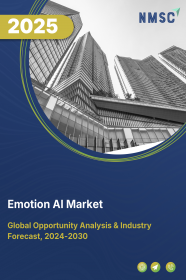
Netherlands Voice Assistant Market by Offering (Hardware (Mobile Device, Smart Speaker, In-Vehicle Assistance, & Other Devices), Software (Integrated, & Standalone), and Services (Support & Maintenance, & Consulting)), by Device (Mobile, PC/Laptop, & Tablet), by Technology (Speech Recognition, & Voice Recognition), by Age Group (Millennials, Generation Z, Generation X, & Baby Boomers), and by Application (Telecom, and Others) – Country Opportunity Analysis and Industry Forecast, 2025–2030
Industry: ICT & Media | Publish Date: 17-Jun-2025 | No of Pages: 261 | No. of Tables: 214 | No. of Figures: 99 | Format: PDF | Report Code : IC3380
Industry Overview
The Netherlands Voice Assistant Market size was valued at USD 144.6 million in 2024, and is predicted to reach USD 621.5 million by 2030, at a CAGR of 27.5% from 2025 to 2030. The Netherlands' strong digital infrastructure and booming e-commerce sector are driving the widespread adoption of voice assistant technologies across the market.
However, the failure of virtual assistants to correctly interpret customer intent serve as a restraint to the market growth. On the other hand, with the inclusion of hyper-personalized services in virtual assistant devices creates future growth opportunities for the industry.
Rise in E-commerce is Driving the Netherlands Voice Assistant Market Growth
The development of e-commerce in the Netherlands is promoting the voice assistant technology by pushing the consumption of voice-enabled solutions to provide convenient shopping experiences. Virtual assistants assist users in searching for products and making orders, making online purchases more convenient.
A 2024 report by the International Trade Administration pointed out that in 2022, 13.9 million Dutch consumers made 347 million online purchases worth more than USD 36 billion. Such growing dependence on online shopping also continue to spur the use of virtual assistants, further boosting their contribution to the e-commerce market.
Advanced Digital Infrastructure and High Technological Readiness Fueling the Market Growth
The advanced digital infrastructure and high levels of technological readiness are propelling the Netherlands voice assistant market demand. Coupled with a well-developed technology sector and access to wide internet coverage, the levels of digital literacy in the country create an atmosphere that is conducive to voice-enabled solutions.
According to the Network Readiness Index 2024, Netherlands scored 73.71 in technology score, ranking the country 3rd globally. Such strong foundation paved ways for itself in adopting virtual assistants across sectors in their advance user experiences and therefore, lead to growth in the market.
Limitations in Customer Intent Recognition Hinders the Netherlands Voice Assistant Market Expansion
The failure of conversational AI to properly identify customer intent hinders the voice assistant market growth in Netherlands. Inadequate comprehension of user commands leads to inefficiencies and decreased effectiveness of voice-activated technology, ultimately impacting user adoption and satisfaction, thus limiting industry growth in the nation.
Ongoing innovation in AI, natural language understanding, and machine learning are necessary to enhance intent detection, deepen user trust, and accelerate wider usage of virtual assistant technology.
Hyper-Personalized Service Integration Paving the Way for Future Market Growth
The adoption of hyper-personalization services creates future growth opportunities for the Netherlands voice assistant market trends with increasingly tailored user interfaces that make the interaction even easier for users. This intelligent technology analyzes the data of users to deliver personalized recommendations, useful reminders, and context-aware response, improving engagement and making day-to-day interactions effortless and rewarding.
For example, in January 2025, Lucid Motors and SoundHound AI collaborated in introducing the Lucid Assistant-a virtual assistant that boasts hands-free, car experiences simplified. Through the analysis of a wake-up speaking phrase such as, hey Lucid, it is possible to interact with the car using natural language by passengers and drivers.
Hyper-personalization enables virtual assistants to propose playlists based on listening behavior, automate mundane tasks such as placing grocery orders as a function of past purchases, or provide specific fitness recommendations through personalized health objectives.
The ability to meet customized demands by users makes hyper-personalized virtual assistants the solutions to go for in fields that range from smart homes to healthcare and retailing-hence accelerating growth in the markets for the future.
Competitive Landscape
The promising players operating in the Netherlands voice assistant industry include Amazon Inc, Meta Platforms, Inc, Microsoft Corporation, Apple Inc, IBM Corporation, Samsung Electronics, Alibaba Group Holding Limited, Orange SA, Verint Systems Inc, OpenAI, Swann Security, Xiaomi Corporation, Zirtual, Nokia Corporations, PolyAI Ltd., Hyperlink InfoSystem, Nuance Communications, SoundHound AI, Mihup.ai, Happyrobot, Bitonic Technology Labs Inc, Script Inc., Aiello AI Inc., VoiceKitt, RowBotAI, CE Info Systems Ltd., Mind-r.ai, Alphabet Inc, Continental AG, and German Autolabs.
Netherlands Voice Assistant Market Key Segments
By Offering
-
Hardware
-
Mobile Device
-
Smart Speaker
-
In-Vehicle Assistance
-
Headphones
-
Other Device
-
-
Software
-
Integrated
-
Standalone
-
-
Service
-
Support & Maintenance
-
Consulting
-
By Device
-
Mobile
-
PC/Laptop
-
Tablet
By Technology
-
Speech Recognition
-
Voice Recognition
By Age Group
-
Millennials
-
Generation Z
-
Generation X
-
Baby Boomers
By Application
-
Telecom
-
Smart Home
-
Entertainment
-
Financial Services
-
Retail
-
Transportation
-
Hospitality
-
QSR/Restaurants
Key Players
-
Amazon Inc
-
Meta Platforms, Inc
-
Microsoft Corporation
-
Apple Inc
-
IBM Corporation
-
Samsung Electronics
-
Alibaba Group Holding Limited
-
Orange SA
-
Verint Systems Inc
-
OpenAI
-
Swann Security
-
Xiaomi Corporation
-
Zirtual
-
Nokia Corporations
-
PolyAI Ltd.
-
Hyperlink InfoSystem
-
Nuance Communications
-
SoundHound AI
-
Mihup.ai
-
Happyrobot
-
Bitonic Technology Labs Inc
-
Script Inc.
-
Aiello AI Inc.
-
VoiceKitt
-
RowBotAI
-
CE Info Systems Ltd.
-
Mind-r.ai
-
Alphabet Inc
-
Continental AG
-
German Autolabs
REPORT SCOPE AND SEGMENTATION:
|
Parameters |
Details |
|
Market Size Value in 2024 |
USD 144.6 million |
|
Revenue Forecast in 2030 |
USD 621.5 million |
|
Value Growth Rate |
CAGR of 27.5% from 2024 to 2030 |
|
Analysis Period |
2024–2030 |
|
Base Year Considered |
2024 |
|
Forecast Period |
2025–2030 |
|
Market Size Estimation |
Million (USD) |
|
Growth Factors |
|
|
Companies Profiled |
30 |
|
Customization Scope |
Free customization (equivalent up to 80 working hours of analysts) after purchase. Addition or alteration to country, regional, and segment scope. |
|
Pricing and Purchase Options |
Avail customized purchase options to meet your exact research needs. |

















 Speak to Our Analyst
Speak to Our Analyst

























